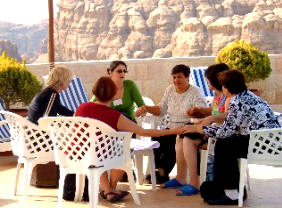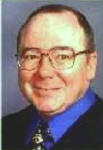
More
News

Across Pacific Magazine | Humour | God at Work | Across Asia | Marine Reach | Rancho de la Paz
MUSALAHA RECONCILIATION
MINISTRIES
BRINGS TOGETHER UNIQUE GROUP OF ARAB AND ISRAELI WOMEN FOR CONFERENCE IN JORDAN By Michael Ireland JERUSALEM, ISRAEL / PETRA, JORDAN (ANS) -- The 20 participants in Musalaha Reconciliation Ministries' recent Women's Leadership Conference composed a very special group of women.
Many of the women had little previous or in-depth involvement in reconciliation activities, he said. "There was quite a mix of backgrounds, especially in the Israeli side, some born and raised in Israel, and some were immigrants who have spent most of their adult years here," Munayer said. He explained: "From the Palestinian side, a number of women from the Palestinian Territories had never met Messianic Israelis. Still, it was more than the diversity of the participants that created this exceptional environment, it was the openness and excitement that they brought along." Munayer continued: "Our first lesson was on listening. After reflecting on verses on how God listens to us, even concerning our smallest needs, we were given some practical tools that we continuously put into practice throughout the conference. We emphasized the importance of hearing a person through until the end. Also we recognized that we all have perspectives and experiences that influence the way we hear others. This is particularly true in our situation, where it is sometimes difficult to hear from the other side without putting up our defenses." This session and the activity that followed sent the tone for the entire conference, Munayer said. "For the rest of the morning, women shared their stories. We heard from each person about their lives, background, and their motivation and experiences in approaching reconciliation. Through these stories we gained insight not only into the individual, but also into their communities and the issues that people face on a personal and community level. " Munayer said some of the women spoke about how they approached the conference with hesitance and slight fear, worried that the sessions would be full of accusations, disputes, and antagonism. "Instead, this beginning on a very personal level brought the group into an atmosphere of listening, openness and empathy. Immediately, from the first day, walls were broken and women were sharing each other's burdens, crying, praying and also laughing together. " In other sessions we explored the stages of reconciliation that people and groups experience, he said. "It helped to identify different phases of relationship-building, sharing, withdrawal, and commitment that we experience now or in the future as we progress in reconciliation. We also looked at the qualities of a leader through the role of Abigail in the story of David and Nabal. She was one among many women who we looked at in the Bible who played a critical role in a certain situation. In this story, Abigail avoided a bloody conflict by taking courageous steps of 'mediation.' Small group discussion followed each session, where we were given time to explore the themes, and in doing so, gained deeper insight into each other's lives, struggles, personalities, ministries. Munayer said that while their time together spent in conference was vital, in Musalaha's experience it has always been a key factor to include opportunities for different kinds of interaction. "One of the days, we took a break from the meeting room and stepped outside into the beautiful ruins of the ancient Nabotean city of Petra. Renowned in the Middle East and around the world for its beautiful tombs and monuments carved into the red sandstone, the incredible beauty of the place even brought tears to some of our eyes. Being outdoors together, provided a chance to walk together, to drift between different women in the group and have conversations. This setting created an excellent setting for building relationships. As one of the participants said, 'As way of observation and stating the obvious... a mutual fun and different activity such as going into Petra did as much as for reconciliation as did the seminars.' " "I enjoyed the conference simply because I learnt so much from all my sisters. It was important for me to understand how the sisters live in Bethlehem and it's surrounding, to get to know your [Musalaha's] work and vision…. The day in Petra helped us to get to know one another in a very relaxed atmosphere -- being out in nature, helping one another to walk and climb, and enjoy the day together," said one participant. Another said: "This group is not a coincidence…. The women were handpicked by God… a perfect puzzle. I want contact with you all on a regular basis. I want true friendships." The final day of the conference was interrupted by the announcement of renewed violence back home, Munayer said. "Our first thought was for family and friends. Immediately our group went to prayer, crying for God's mercy and healing in our land. We also were concerned about the impact of this event on our group. Would the ugly realities of our situation throw off this delicate process that we had begun? To the contrary, the importance of reconciliation and reaching the communities with the message of peace became very real." He continued: "This group of woman proved to be women of action. Following the conference there was a real hunger to continue the fellowship in a very tangible way. We returned to our communities in high spirits, and already with specific plans to meet again." One attendee commented: "I just wanted to say how GREAT it was to be with all of you. I pray that each thing that the Lord did in our hearts while we were together will remain strong in the test of time….I will say again how wonderful it was for me to be together with you all and make new friends and fan the flame of God's love and reconciliation he gave us on the cross." Munayer concluded: "This year the Lord has provided many opportunities for us at Musalaha to expand our ministry. It has been a tremendous year of growth, as new people and groups are sharing the vision and participating in reconciliation efforts. We want to thank you for your prayers and encouragement; this truly has been a blessed year. Check out our newly designed web site at www.musalaha.org." If you would like to contribute towards covering the expenses of Musalaha projects, please send donations (tax deductible) to Reconciliation Ministries (PO Box 238, Medina, WA 98039-0238, USA), or in the UK to The Andrew Christian Trust (123 Smithills Dean Road, Smithills, Bolton, Lancashire, BL1 6JZ; Registered Charity Number: 327845) Make checks out to Reconciliation Ministries or The Andrew Christian Trust, and in a letter designate the funds for Musalaha. Donations can also be sent directly to Musalaha at the PO Box 52110, Jerusalem, Israel 91521.
|
ASSIST News Service (ANS) - E-mail
Across Pacific Magazine | Humour | God at Work | Across Asia | Marine Reach | Rancho de la Paz

